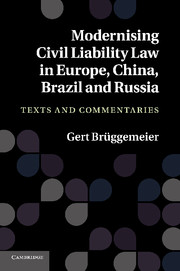Book contents
- Frontmatter
- Contents
- Foreword
- Preface
- Acknowledgements
- Table of cases
- List of abbreviations
- PART 1 Draft Bill on Civil Liability Law
- PART 2 Two European reform proposals on liability law
- A Principles of European Tort Law (PETL) 2005
- B Draft Common Frame of Reference (DCFR) Book VI: Non-contractual liability arising out of damage caused to another (2009)
- PART 3 Recent legislation on liability law
- Select bibliography
- Index
B - Draft Common Frame of Reference (DCFR) Book VI: Non-contractual liability arising out of damage caused to another (2009)
from PART 2 - Two European reform proposals on liability law
Published online by Cambridge University Press: 25 May 2011
- Frontmatter
- Contents
- Foreword
- Preface
- Acknowledgements
- Table of cases
- List of abbreviations
- PART 1 Draft Bill on Civil Liability Law
- PART 2 Two European reform proposals on liability law
- A Principles of European Tort Law (PETL) 2005
- B Draft Common Frame of Reference (DCFR) Book VI: Non-contractual liability arising out of damage caused to another (2009)
- PART 3 Recent legislation on liability law
- Select bibliography
- Index
Summary
Chapter 1 Fundamental provisions
VI.–1:101 Basic rule
(1) A person who suffers legally relevant damage has a right to reparation from a person who caused the damage intentionally or negligently or is otherwise accountable for the causation of the damage.
(2) Where a person has not caused legally relevant damage intentionally or negligently that person is accountable for the causation of legally relevant damage only if Chapter 3 so provides.
VI.–1:102 Prevention Where legally relevant damage is impending, this Book confers on a person who would suffer the damage a right to prevent it. This right is against a person who would be accountable for the causation of the damage if it occurred.
VI.–1:103 Scope of application VI.–1:101 (Basic rule) and VI.–1:102 (Prevention):
(a) apply only in accordance with the following provisions of this Book;
(b) apply to both legal and natural persons, unless otherwise stated;
(c) do not apply in so far as their application would contradict the purpose of other private law rules; and
(d) do not affect remedies available on other legal grounds.
Chapter 2 Legally relevant damage
Section 1 General
VI.–2:101 Meaning of legally relevant damage
(1) Loss, whether economic or non-economic, or injury is legally relevant damage if:
(a) one of the following rules of this Chapter so provides;
(b) the loss or injury results from a violation of a right otherwise conferred by the law; or
[…]
- Type
- Chapter
- Information
- Modernising Civil Liability Law in Europe, China, Brazil and RussiaTexts and Commentaries, pp. 149 - 164Publisher: Cambridge University PressPrint publication year: 2011



